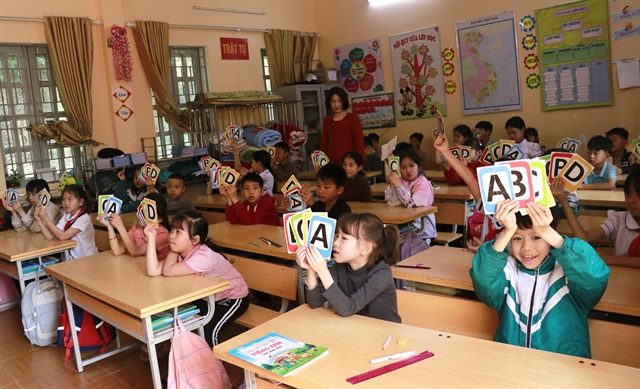 Society
Society

 |
| Schoolchildren in Mù Cang Chải District of the mountainous Yên Bái Province. — VNA/VNS Photo Đinh Thùy |
HÀ NỘI — Free full-day schooling will be applied from the upcoming 2025-26 academic year, aiming to reduce the financial burdens for families and build a fair, modern education system.
Students in border communes and mountainous areas will also receive subsidies for school lunches under the initiative, which was announced by Party General Secretary Tô Lâm in a statement by the Office of the Central Party Committee in late April.
This supportive policy, which involves two teaching sessions per day, has been well-received by teachers, parents and education experts.
Đoàn Thị Côi, a mother of two secondary school students in Ia Pa District of Gia Lai Province, told Voice of Vietnam (VOV): "My family has three young children and relies on farming for a living, so our income is not very stable.
“Some days, my children only attend school for half a day and have to walk a long way home just to eat alone, as my husband and I are out working. If they could study full-day and have lunch at school, my child would be in a safe place and receive proper nutrition. That would give us parents peace of mind.
“For people in mountainous areas like us, we feel grateful because this policy offers ethnic children a real chance to move forward in life.”
The policy is also expected to alleviate the tuition fee burdens on many families in remote areas.
Nguyễn Thị Hồng, mother of a fourth-grade student in Ý Yên District, Nam Định Province said: “It has not been easy to provide full meals and basic school supplies for our child, let alone pay for full-day classes.
“When I heard that from the 2025 school year, my child would be able to attend school full day, free of charge and even with lunch support, I was honestly moved to tears. This is a humane and practical policy that helps reduce burdens on low-income families like ours to focus on raising our children to become good citizens.”
Vũ Văn Tùng, an educator who has dedicated years of his teaching career to children in remote areas and is currently working at Đinh Núp Primary and Secondary School in Gia Lai Province, said: “Over 90 per cent of our students here belong to ethnic minority groups and maintaining class attendance has always been a major challenge.
“With the tuition waiver and school lunch support, our students will not only receive academic instruction and physical development, which I strongly believe will greatly improve the quality of local education.”
Currently, only Grade 1 students in Đinh Núp School receive lunch support under the ‘Only Rice Is Not Enough’ programme, run by the Mountainous Underprivileged Students Fund (MUSF).
Most of the other children often cross mountains and rivers to have lunch with their parents on their rice terrace where they work, before coming back to school for afternoon classes. As a result, many students frequently miss afternoon sessions, said Tùng.
Tùng believes providing school lunches would encourage students to stay for afternoon classes and improve class attendance in these areas.
He added: “This policy will certainly bring positive changes to education, especially in disadvantaged areas. It will also help children in the mountainous areas not to be left behind and give them a path toward comprehensive development.
“Not just me, but all teachers, parents and residents in remote areas are overjoyed by the news of free tuition and lunch support starting from the 2025-26 school year.
“If implemented, this policy will improve the quality of education in underprivileged zones and prevent students from quitting school due to hardship,” said Tùng.
Practical measures
Education experts share the viewpoint that providing school lunches not only ensures adequate nutrition for students and their physical health for learning, but also helps maintain class attendance, reduces dropout rates and enhances comprehensive education quality.
Dr Nguyễn Tùng Lâm, chair of the Education Council at Đinh Tiên Hoàng High School in Hà Nội, said: “We are working toward a modern and equitable national education system.
"The free full-day schooling is expected to improve academic outcomes while also focusing on the students’ artistic, cultural and physical growth," he said.
“However, effective policy implementation requires proper infrastructure, qualified teachers, relevant lesson plans and coordination across ministries, rather than the sole responsibility of the education sector.”
Associate Professor Dr Trần Thành Nam, Vice Principal of the University of Education (under Việt Nam National University – Hà Nội), also praised the tuition waiver and meal support for full-day schooling as a pioneering and practical decision.
“If carried out successfully, this initiative will make progress in narrowing the gap in learning opportunities and education quality between different regions, which is a step toward equality in education,” said Nam.
“No child should be left behind simply because of their family background. This is a right investment in humans – an important resource for the country’s future development,” he said. — VNS




